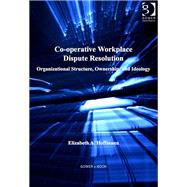Co-operative Workplace Dispute Resolution: Organizational Structure, Ownership, and Ideology
, by Hoffmann,Elizabeth A.- ISBN: 9781409429241 | 1409429245
- Cover: Hardcover
- Copyright: 7/30/2012
It is important to understand the complex dynamics involved in workplace dispute behavior in order to improve the way organizations deal with unwelcome but inevitable occurrences. These issues have indeed been researched from management studies, sociology, industrial relations, political science, and law-and-society perspectives. Little is said, though, about how organizational form itself might impact employees' methods for resolving their workplace disputes. Discussion is almost exclusively about what occurs in conventional, hierarchical organizations.In Co-operative Workplace Dispute Resolution Elizabeth Hoffmann moves beyond conventional wisdom to consider the question of how formal and informal workplace disputes are raised in the absence of formal hierarchy. Worker co-operatives present a stark contrast to conventionally organized businesses in that the co-operatives attempt to evenly distribute power and ownership, encourage worker control through egalitarian ideologies and flattened management structure, and engage in concerted efforts to minimize power imbalances. Nevertheless, they do continue to have many of the same goals as conventional businesses, such as profit and efficiency.Acknowledging that only a small proportion of workers are involved in co-operatives, Dr Hoffmann argues that disentangling the impacts of hierarchy and power, as does occur in co-operatives, provides insights into the feasibility of a key plank in many mainstream business reforms - greater worker involvement and ownership. Representing an extreme form of worker involvement beyond mere stock sharing or participation in labor-management committees, worker co-operatives shed new light on the potential benefits and drawbacks of more modest innovations in conventional businesses.This book focuses on dispute resolution strategies at matched pairs of worker co-operatives and conventional businesses in three very different industries: coal mining, taxicab driving, and wholefood distribution. Drawing on interviews with workers and managers, the author has made some intriguing discoveries. Her central finding is that the worker co-operative members possess more dispute resolution strategies than their conventionally employed counterparts. So, although members of all co-operatives do not resolve their disputes one way and all non co-operative employees don't resolve theirs another way, there are clear differences attributable to the different kinds of organizational forms.As well as advancing theoretical understanding of the issues for sociologists, Dr. Hoffmann has much to offer mainstream business. Many of the benefits found in worker cooperatives might be achieved, at least to some degree, by conventional businesses that wish to embrace specific attributes of the cooperatives, such as flatter hierarchies, greater worker involvement, and increased information sharing.







